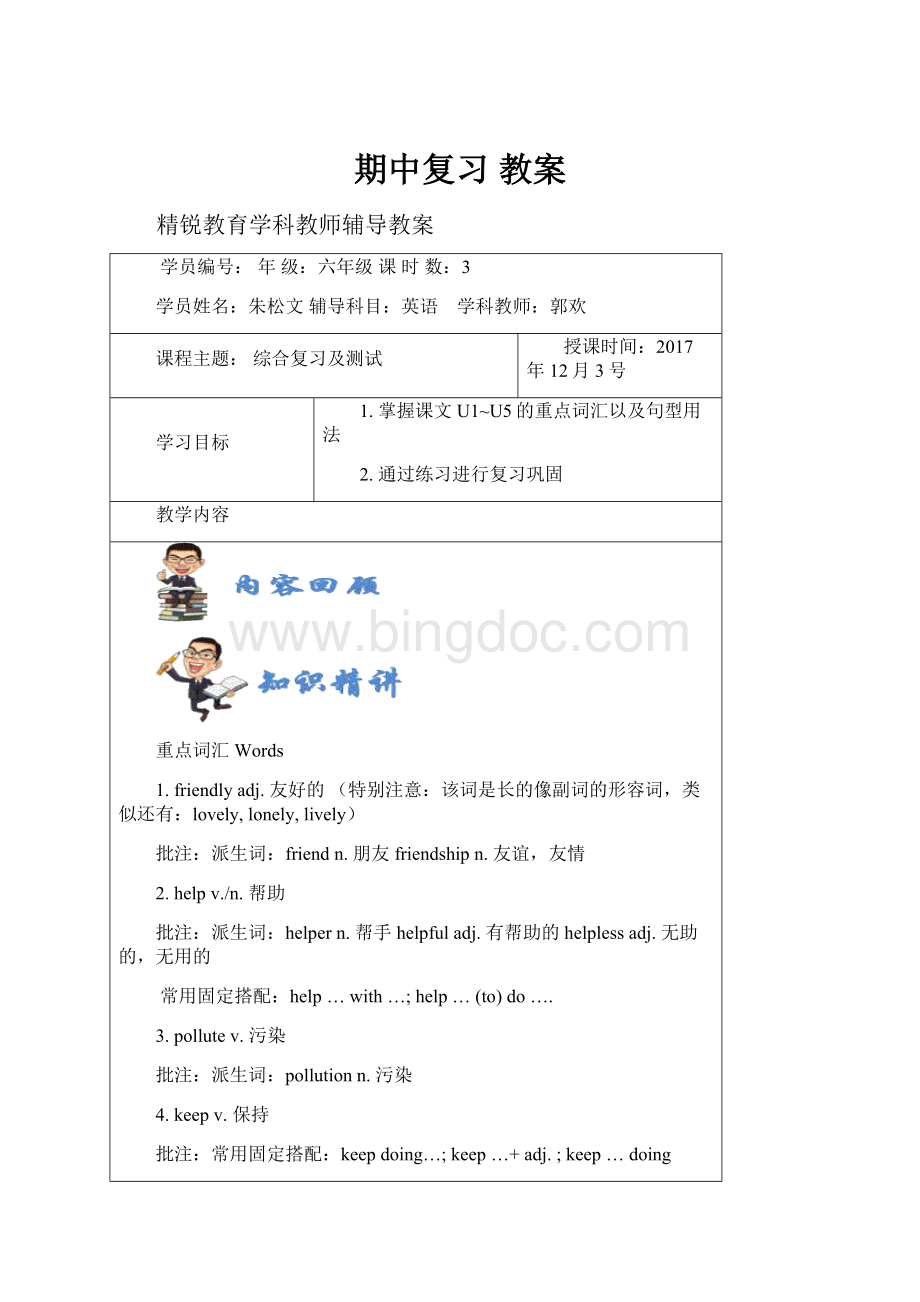期中复习教案.docx
《期中复习教案.docx》由会员分享,可在线阅读,更多相关《期中复习教案.docx(18页珍藏版)》请在冰点文库上搜索。

期中复习教案
精锐教育学科教师辅导教案
学员编号:
年级:
六年级课时数:
3
学员姓名:
朱松文辅导科目:
英语学科教师:
郭欢
课程主题:
综合复习及测试
授课时间:
2017年12月3号
学习目标
1.掌握课文U1~U5的重点词汇以及句型用法
2.通过练习进行复习巩固
教学内容
重点词汇Words
1.friendlyadj.友好的(特别注意:
该词是长的像副词的形容词,类似还有:
lovely,lonely,lively)
批注:
派生词:
friendn.朋友friendshipn.友谊,友情
2.helpv./n.帮助
批注:
派生词:
helpern.帮手helpfuladj.有帮助的helplessadj.无助的,无用的
常用固定搭配:
help…with…;help…(to)do….
3.pollutev.污染
批注:
派生词:
pollutionn.污染
4.keepv.保持
批注:
常用固定搭配:
keepdoing…;keep…+adj.;keep…doing
5.promisen./v.承诺,保证
批注:
常用固定搭配:
promise(not)todo
makeapromise答应,许诺
keepone’spromise遵守诺言
breakone’spromise违背诺言
6.spendv.度过;花费(时间,金钱)(spend---spent–spent)
批注:
【比较】spend,take,cost的用法
①spend主语为“人”
eg:
Hespendsmuchmoneyonbooks.
eg:
Ispentanhourwritingtheletter.
②take主语可以是“事或物”(包括形式主语it)
eg:
Ittookmetwohourstowalktothestation.
eg:
Theflightwilltakethreehours.
③cost主语是“物”
eg:
Thecomputercostme$2000.
7.luckyadj.好运的;幸运的
批注:
派生词:
luckn.运气luckilyadv.幸运地
8.activityn.活动
批注:
派生词:
activeadj.活跃的;积极的
9.plann./v.计划
批注:
常用固定搭配:
plantodo…计划做某事e.g.Iplantogotoseeamovietonight.
二、重点词组Phrase
1.workhard勤奋学习
2.belatefor迟到
3.forthefirsttime第一次
4.helpeachother相互帮助
5.lookafterwell=takegoodcareof好好照顾
6.bekindtosb.对某人和善
7.share…withsb.与某人分享某物\
8.onawinternight在冬天的晚上
9.pickup拾起,捡起
10.put…intosomeplace把某物放进某地
11.makefriends交朋友
12.thefriendoftheearth地球的朋友
13.walktoschool=gotoschoolonfoot走路去学校
14.whatabout+doing…=howabout+doing…怎么样
15.bekindto=befriendlyto对…友好
16.farawayfrom远离……
17.putout扑灭
18.findout查明,弄清(情况)
课堂巩固
1.Itismy________timetotravelbyplane.(one)
2.It’srainingoutside.Howabout_________booksnow?
(read)
3.Welearnsomethingabouttheair___________fromthebooks. (pollute)
4.Ourteachersarevery_________tous,sowelikethemverymuch. (friend)
5.Thetwo__________fromAmericawillvisitourschoolnextweek. (family)
6.Jackis___________avisittotheGreatWall. (plan)
7.Bothhisfatherandbrotherare____________. (fire)
8.Don’t______(entrance)theteachers’officewithoutpermission(未经允许).
9.Sheusuallygoes______(shop)withherfriendsatweekends.
10.Janeismygoodfriend.Sheisalways______(help).
11.I’llpossiblybeanEnglish______(teach)likeMrs.Liinthefuture.
12.Youshould______(use)shoppingbagstoprotecttheenvironment.
Keys:
first;reading;pollution;friendly;families;planning;firemen;enter;shopping;helpful;teacher;reuse
三、重要句型ImportantSentencesstructures
1.wh-question:
wh-问句
(l)Wherehaveyoubeenin……?
在……你去过什么地方?
这是由where引导的特殊疑问句,用来询问某人在具体的一个地方的哪些地方(两地之间具有所属关系),
(2)Whichplaceshallwevisit?
我们去哪里游览呢?
whichplace意为“哪个地方”,一般用以要求某人在有限数量中指明某人某事或某地。
(3)Whenshallwegothere?
我们什么时候去那里?
when意为“什么时候”,用来询问不具体的时间
(4)WhattimeonSaturday?
星期六的什么时间?
whattime是个疑问词,意为“什么时间”用来询问具体的时间:
几点钟
批注:
wh-问句是本册的重点,也是初中阶段的重点句型转换题型。
所以,建议老师在讲授该点的时候让学生在笔记本做好专门的笔记,把每次碰到的该类句型整理在一起,这也是在教给学生怎么样整理重点。
2.Howquestions:
How问句
(l)Howaboutteno’clockinthemorning?
上午十点钟怎么样?
howabout:
“……怎么样”,用于询问消息或征求别人的意见和建议,后面常接名词或动名词,与whatabout同义,可以互相替代。
(2)Howmuchdoesitcost?
它花费多少钱?
howmuch在句子中的意思是“多少钱”,用来询问价格。
howmuch还可以用来提问不可数名词的数量,
(3)Howarewegoingtogetthere?
我们将怎样到达那里?
how在这里用于询问交通工具
批注:
与wh-问句一样,how问句也是初中阶段的重点句型转换题型。
本单元中涉及的还不是太多,针对学生的接受程度,老师可以适当给学生提下:
howoften,howlong,howsoon句型。
3.一般现在时整理总结:
1)经常性或习惯性的动作,常与表示频度的时间状语连用。
时间状语:
everyday/month/year,often,usually,always,sometimes,seldom,never,onSunday,once/twiceaweek
e.g.Ileavehomeforschoolat7everymorning.
2)客观真理,客观存在,科学事实。
e.g.Theearthmovesaroundthesun.
3)表示格言或警句中。
e.g.Pridegoesbeforeafall. 骄者必败。
4)现在时刻的状态、能力、性格、个性。
e.g.AnnWangwritesgoodEnglishbutdoesnotspeakwell.
Heisbusyatthemoment.
5)用于时间或条件状语从句中,代替一般将来时
e.g.Iwillbehappyifyouallcome.
Shewillgetasurprisewhenshegetsin.
批注:
一般现在时中建议老师多给学生强调表示该时态的时间状语,也可以让学生理解后复述给老师听。
另外,对于基础偏差点的学生,以下的动词第三人称单数形式变化规则及句型变化也要再讲解讲解。
一般现在时句型转换
否定形式:
①am/is/are+not;
②此时态的谓语动词若为行为动词,则在其前加don't,如主语为第三人称单数,则用doesn't,同时还原行为动词。
一般疑问句:
①把be动词放于句首;
②此时态的谓语动词若为行为动词,用助动词do提问,如主语为第三人称单数,则用does,同时,还原行为动词。
e.g.Helikesplayingfootball.---Hedoesn'tlikeplayingfootball.---Doeshelikeplayingfootball?
4.一般过去时整理总结:
1)在确定的过去时间里所发生的动作或存在的状态。
时间状语:
yesterday,lastweek,anhourago,theotherday,in1982,justnow等。
e.g.Wheredidyougojustnow?
2)表示在过去一段时间内,经常性或习惯性的动作。
e.g.WhenIwasachild,Ioftenplayedfootballinthestreet.
3)表示主语过去的状态或特征。
e.g.Shewasataxidriveryearsago.
Shewillgetasurprisewhenshegetsin.
批注:
一般过去时的时间状语也很重要,要多跟学生说几遍。
对于基础偏差点的学生,动词过去式的变化规则再带学生看一遍,但更重要的是课本后面附录的不规则动词的过去式,要从开始就定量让学生熟记。
一般过去时句型转换
否定形式:
①was/were+not;
②在行为动词前加didn't,同时还原行为动词。
一般疑问句:
①was或were放于句首;
②用助动词do的过去式did提问,同时还原行为动词。
e.g.Hedidhishomeworkyesterday.---Hedidn'tdohishomeworkyesterday.---Didhedohishomeworkyesterday?
5.一般将来时整理总结:
1)表示将要发生的动作或存在的状态。
也可以表示对将来事情的一种主观推测。
时间状语:
thisevening,thisafternoon,thisweek,thismonth,thisyear,nextweek,nextmonth,tomorrow,tomorrowmorning,thedaybeforetomorrow,inthefuture等。
2)构成方式:
will+动词原形(第一人称后也可用shall,在疑问句中,第一人称后多用shall,来征求对方意见。
)
begoingto+动词原形
3)begoingto:
a.主语的意图,即将做某事。
e.g. Whatareyougoingtodotomorrow?
b.计划,安排要发生的事。
e.g.Theplayisgoingtobeproducednextmonth.
c.客观情况下要发生的事(非主观意愿)
e.g. Lookatthedarkclouds,thereisgoingtobeastorm.
批注:
建议结合3),给学生讲解下will+动词原形与begoingto+动词原形的区别:
begoingto指当前已计划过或思考过的意图和打算,will/shall表示未事先思考或未计划过的意图;
begoingto还可以表示客观迹象表明马上要发生的动作,而will则表明说话者的观点,主观意识。
4)否定形式:
1)will+not2)am/is/are+not+doing.
一般疑问句:
1)will提到句首2)把be动词放于句首。
e.g.a.Wearegoingtowatchafootballmatchtomorrow.
---Wearen'tgoingtowatchafootballmatchtomorrow.
---Areyougoingtowatchafootballmatchtomorrow?
b.HewillflytoShanghaitomorrow.
---Hewon'tflytoShanghaitomorrow.
---WillheflytoShanghaitomorrow?
6.现在进行时整理总结:
1)基本构成:
am/is/are+现在分词;时间状语:
now,atthistime,thesedays,etc.
2)表示现在(指说话人说话时)正在发生的事情。
e.g.Wearewaitingforyou.
3)目前阶段正在进行
e.g.Wearewritingapaperonpollutionthesedays.
4)否定形式:
be+not+doing.
一般疑问句:
把be动词放于句首。
e.g.Heisreadingabook.---Heisn'treadingabook.---Ishereadingabook?
批注:
不用现在进行时的几种情况
1)用感官动词表达说话时的感觉时,用一般现在时,不用现在进行时(feel都可)
Ihearanoiseoutsidethewindows,andyou?
I’mnotfeelingwelltoday.
2)某些表示心里状态的词不用现在进行时,如like,want,need,wish,remember,find,think
Helovesherverymuch.
3)瞬间动词:
如accept,receive,complete,finish,give,allow,decide,refuse.
Iacceptyouradvice.
7.现在完成时整理总结:
1)表示发生在过去的对现在仍有影响的动作时,时间状语:
already,yet,just,once,twice,ever,never,threetimes,before等。
Ihaveneverseensuchfinepicturesbefore.(我以前从来没有看过这么好的画)
HehasjustgonetoEngland.(他刚去英国)
2)表示在过去开始一直延续到现在(可能延续下去)的动作或状态时,时间状语有:
for(twoyears),since1990,since(twoweeksago)和since引导的状语从句。
Ihavebeenawayfrommyhometownforthirtyyears.(我离开家乡有30年了)
UncleWanghasworkedinthefactorysinceitopened.(自从这家工厂开张,王叔叔一直在那儿工作)
3)havebeento与havegoneto的区别:
havegoneto:
已经去了(表示人不在这里)
havebeento:
去过(表示人在这里)
--WhereisMr.Li?
–HehasgonetotheUK.(李先生在哪里?
他去了英国。
)
--DoyouknowsomethingaboutBeijing?
–Yes,IhavebeentoBeijingthreetimes.
(你知道北京的情况吗?
是的,我去过那里三次。
)
批注:
该点是初中阶段的重点,建议老师结合上面例句让学生理解这两个短语的区别。
4)否定形式:
have/has+not+过去分词(句末通常加yet).
一般疑问句:
have或has提句首(句末通常加yet)。
e.g.IhavebeeninShanghaifor5years.
---Ihaven'tbeeninShanghaifor5yearsyet.
---HaveyoubeeninShanghaifor5yearsyet?
课堂巩固
I.Choosethebestanswer
1.Whichofthefollowingiscorrectfortheunderlinedwordinthesentencebelow?
I’mlookingforanassistantwhocanworkoncomputers.
A.[wɔːk]B.[wɜːk]C.[wəʊk]D.[wɔk]
2.Whichoftheunderlinedpartsisdifferentinpronunciationfromothers?
A.DuringmystayinUK,ItriedtocatcheverychancetospeakEnglish.
B.Mymothermadeanicecakeformeyesterday.
C.Isentamoderncameratomybrotherashisbirthdaypresent.
D.Wouldyoupleasecarrytheheavyboxforus?
3.You__giveuphalfway.Youmusttryyourbesttodoitwell.
A.hadnotbetterB.hadbetternotC.havenottoD.hadbetterdon’t
4.Ireallydon’tknow_____toleaveforthevillagebybike.
A.whenB.whereC.whatD.how
5._____MichaelPhelpsreallycreatedaphenomenon(神话)inswimmingatthe2016OlympicGames.
A.31-years-oldB.31-year-oldC.31year-oldD.31yearsold
6.Thewhitehorserunsfast,buttheblackoneruns_____.
A.morefastB.evenfasterC.muchfastD.farmorefast
7.Whatnationalityisthewomaninblue?
A.GermanyB.BritainC.China.D.Japanese
8.Whentheaccidenthappened,Johnwasdriving____thecar.
A.beforeB.infrontofC.InthefrontofD.from
9.-_____ayeardoyougotraveling?
-Onceortwice.
A.HowlongB.HowmanytimesC.HowoftenD.Howsoon
10.Ididn’tstop____mypurseuntilIfinally_____ithadbeenstolen.
A.lookingfor,foundB.lookingfor,foundout
C.tolookfor,foundD.tolookfor,foundout
11.Tomasked________.
A.ifthestudentswillattendthemeetingnextMonday.
B.whendidthestudentshaveatalkyesterday.
C.howmanystudentswouldtakepartinthemeetingthenextweek.
D.whatwillthestudentsdotomorrow.
12.NeitherthejeansnortheT-shirt____me.
A.fitB.Don’tfit.C.fitsD.doesn’tfit
13.LetustryourbestandenjoyourselvesinShangbaoMiddleSchool,_?
A.ShallweB.willyouC.haven’tweD.aren’twe.
14.-AlltheclassteachersinGradeSixarehardworkingandenergetic(充满活力的).
-____
A.Soarethey.